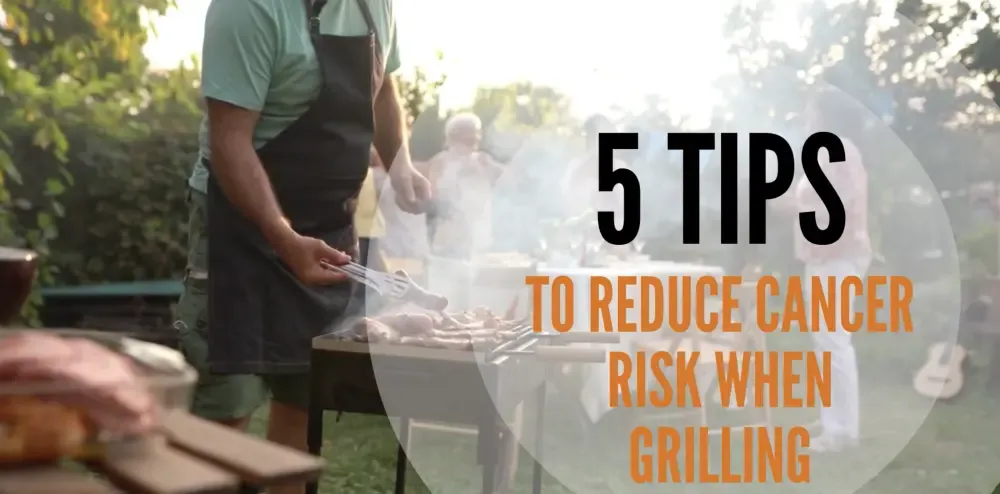Popping a few burgers or steaks on the grill can be a fun and relaxing way to enjoy summer with family and friends, but some methods of grilling are riskier than others. Cooking with charcoal or cooking your meat incorrectly may be linked to an increased risk of cancer—but there’s no need to avoid the grill completely.
Know the Connection Between Cancer and Grilling
While you can grill safely, many common foods and grilling techniques can increase your risk of exposure to cancer-causing substances. Here’s what to look out for:
- Cooking meat at high temperatures: When muscle meat (including beef, pork, fish, or poultry) is cooked using a high-temperature method like grilling directly over an open flame, chemicals called heterocyclic amines (HCAs) form. When fat drips onto the grill, the resulting flames produce polyaromatic hydrocarbons (PAHs). Both chemicals have been linked to changes in DNA that may increase cancer risk.
- Grilling with red meat: Consuming red meat has been linked to multiple health risks, including an increased risk of colon and rectal cancers.
- Grilling meat with preservatives: Processed meats, like hot dogs and sausages, often contain preservatives that have been linked to increased colorectal cancer risk.
- Cooking with charcoal: Charcoal itself does not produce cancer-causing agents. However, in addition to the risk of cooking food at high temperatures over an open flame, charcoal can produce a lot of smoke, which can increase cancer risk.
Tips for Grilling Safely
Knowing what to avoid can help you plan a healthier grill menu. Try these tips for reducing cancer risk:
- The leaner, the better: Meat that produces less fat, like chicken, fish, or grass-fed beef, has a reduced risk of creating PAHs from fat dripping on the grill. Cutting the fat off your meat is also a safer option.
- Don’t forget the fruits and veggies: Unlike muscle meats, fruits and vegetables won’t produce HCAs when cooked with high-temperature methods, so grilling things like bell peppers, mushrooms, or even pineapple reduces the risk of grilling, especially if you’re using a charcoal grill.
- Put it on a skewer: Cutting your meat into smaller pieces is going to reduce the amount of time it takes to cook, and the amount of time it spends on the grill, leading to less exposure to cancer-causing agents. Try a kebab with smaller pieces of meat for a fun, safer twist on a grilled meal. For bigger pieces of meat, flip often to minimize exposure.
- Foil is your friend: Wrapping meat in a foil packet before placing it on the grill will prevent fat from dripping and producing PAHs; wrapping any fruit or vegetables you’re grilling along your meat will protect them from any chemicals produced by the meat. Be careful to wrap your food, not the grill—lining grill grates with foil can restrict airflow inside the grill and create a dangerous situation.
- Go low and slow: A gas grill will use lower temperatures and create less smoke, lowering your cancer risk. If you choose to use a charcoal grill, try selecting charcoal with a lower burning temperature. Although char is often considered a hallmark of grilling, you’ll want to avoid them, or at least cut the charred pieces of the meat, to avoid exposure to cancer-causing chemicals.




